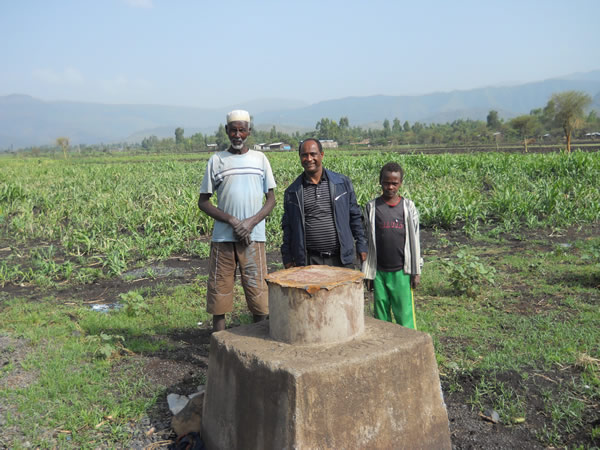
Tsegaye Tadesse spent a month in Ethiopia this summer advancing several collaborative projects related to food and water on behalf of an interdisciplinary team from the University of Nebraska-Lincoln. Tadesse is a climatologist and remote sensing expert with the National Drought Mitigation Center, based at UNL’s School of Natural Resources.
While in Ethiopia, Tadesse visited sites that the project collaborators in Ethiopia identified as good locations to pilot new low-technology wells, and observed that a reliable supply of fresh water could transform many aspects of agriculture, health and community.
“The sites are selected very carefully,” Tadesse said. “There are water resources (groundwater) in Ethiopia but there’s not much irrigation in the country. Besides, most farmers are using old technology to farm, like oxen, not tractors. It’s hard work and inefficient for food security. Instead, they could drill wells, so if the rain fails, they will not go hungry. The quality of water they’re drinking in some areas is not suitable for drinking. And women are carrying water and fetching firewood.” Such work is difficult, requires long periods away from home, is tiresome, and can be dangerous.
But he noted that if irrigation becomes more widespread, it will be necessary to monitor groundwater to ensure that it isn’t being used faster than it is replenished.
“We have to look at this proactively,” he said. “How do you use most efficiently the water resources that you have? How would irrigation impact the environment? The people? What kind of changes would occur to the economy, or to society? That’s why we have designed our projects to be multidisciplinary in scope.”
Besides Tadesse, the UNL team includes anthropologists, an agronomist and a soil scientist, and most understand the culture and speak one or more of the major ethnic languages in Ethiopia.
The project to provide manually drilled wells is sponsored by the Robert B. Daugherty Water for Food Institute at UNL. Tadesse said the team is currently seeking more resources for drilling and to fund graduate students at Ethiopian partner universities.
Tadesse also spent some time working with colleagues at Wollo and Haramaya universities to finalize information on cropping systems and anthropometric data from a survey of 350 households, a project funded by UNL’s Agricultural Research Division. “Preliminary data shows malnutrition is evident in these areas,” he said.
Tadesse also met with faculty and administrators at Wollo University and at Haramaya University to plan study abroad opportunities for UNL students in Ethiopia through the TEF project. “It’s all about TEF: Internationalizing Teaching, Extension and Farming Research in Ethiopia” is a project supported by a U.S. Department of Agriculture International Science and Education grant. This project will support study abroad opportunities, create a new multi-disciplinary course on food security, and enhance other research and teaching capabilities related to the collaboration with Ethiopia.
At Addis Ababa University, Tadesse worked with his graduate student, Getachew Berhan Demisse, who is analyzing satellite data to anticipate drought up to four months into the future.
Besides working on established projects, Tadesse met with many other potential collaborators, including the Ethiopian Agricultural Transformation Agency, the International Water Management Institute, the Ethiopian Institute of Water Resources, USAID, the National Meteorological Services of Ethiopia and the Gates Foundation in Ethiopia.
- Kelly Helm Smith, National Drought Mitigation Center